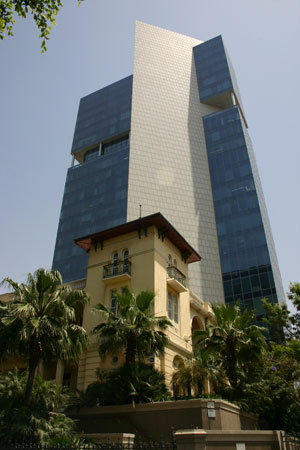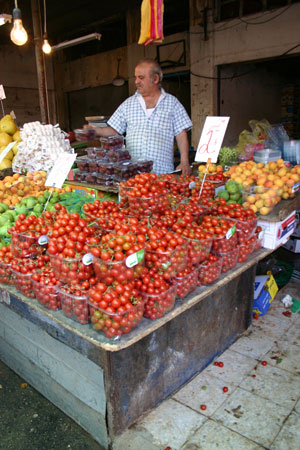TEL AVIV - The beach in front of the Hilton Hotel is filled with bikini-clad women and bare-chested men riding rainbow coloured-windsurfers. Flirting between the two camps is at high tide - the winks and whistles coming in waves.
Laughter spills out of the bars and cafes that line the sandy shore. Patrons clink glasses and toast each other with “lechaim” – the Hebrew equivalent of “cheers”. Everyone, it seems, is in a festive mood.
“Even the politicians loosen their ties in Tel Aviv,” a local woman tells me as she points out a member of the Kaneset – Israel’s parliament – walking nonchalantly in front of us – his crisp white shirt minus a tie - on this sun-drenched afternoon.
There’s a youthful playfulness about Tel Aviv. And that makes it unique in this land of ancient cities. Founded in 1909, Tel Aviv is the new kid on the block in comparison to the wiser, older Jerusalem and its centuries of history.
“Jerusalem is our biggest city – our most important city. Tel Aviv is our fun city,” a young server at one of the city’s trendy new brew pubs tells me later. “People go to Jerusalem to pray – they come here to play.”
And they play hard in Tel Aviv. Its clubs and bars are usually filled to capacity on Thursday nights – the preferred night to let loose - with a good portion of the overflow crowds made up of young people from other nearby cities, including Jerusalem
The word “Tel” in Hebrew means ancient ruins while “Aviv” translates to spring. Together they give hope that “the ancient world will flourish again.”
Tel Aviv’s young, however, seem to be quite content in their modern world of brew pubs, bars and discos. So they gather at the city’s revitalized port area, where old warehouse have been transformed into hip restaurants and bars, and watch the sun dip into the Mediterranean horizon before dancing and laughing the night away.
“This is where it’s happening,” a young man named Rudy, a former New Yorker, tells me as we enjoy a drink at a trendy restaurant called Boya on the port boardwalk.
The restaurant is filled with mostly young Israelis enjoying traditional dishes that have a distinct Turkish influence. Not surprising, since the Turks ruled this part of the world from 1517-1917. The chefs at Boya have added their own personal touches to the dishes and the results are mouthwateringly good.
“You must try one of the eggplant dishes,” a young diner encourages me.
One of my dinner companions tells me the story of the sultan who demanded his chef come up with 1,000 ways to cook eggplant or the chef would lose his life. My modern-day chef delivers his version in a rich, creamy yogurt sauce and, as I tell the table: “it’s to die for.”
As the clock hits nine, more and more young people begin arriving at the trendy Boya. A server tells people here usually eat much later than North Americans – the preferred times being between 9 and 10 p.m.
Talk at the tables is not about political unrest or terrorist threats but rather whether they can afford to buy their first apartment. By all accounts, it’s a long process. One of the young Israelis tells me to get the money to buy a 100 square metre flat in Tel Aviv – which normally costs in the $300,000 U.S. range – will take “15 years of hard work.”
And homes?


Left: Old and new Israel coexist very nicely in Tel Aviv. Right: The market in Tel Aviv is an exciting place.
My young friends erupt into laughter. Apparently, homes in land challenged Tel Aviv are only for millionaires.
Drinking is relatively new to Tel Aviv as well, I’m told later at a restaurant called the Brewhouse at 66881 Rothschild Blvd, which sits directly across the street from the renowned building where Israel’s nationhood was born.
Apparently Russian immigrants introduced Tel Aviv residents to vodka and they’ve been toasting their good fortune of living in one of the world’s most vibrant cities ever since.
The port area is just one of many vibrant places in Tel Aviv. Along the promenade that stretches five kilometers in front of some of the most modern hotels in the Middle East, youthful laughter spills out of the cafes and bars. Young people on roller blades jostle for position with skate boarders and the elderly pushing their walkers.
On fashionable Shenkin St., young people drop into a jewelry shop made famous when pop icon Britney Spears told friends she favoured the collection.
Then there’s Caramerla market, where everyone seems to congregate on crowded, narrow streets to buy fresh fruit and vegetables. In the same area, the city’s artisans display their wares in front of some of the city’s original buildings that are now being lovingly restored to their former glory.
Even industry in Tel Aviv exhibits a youthful haughtiness. The world’s biggest and best high-tech companies have all set up shop in the impressive glass and steel towers of Tel Aviv and the city lives up to its reputation as the Silicone Valley of Israel.
Even the old look young in Tel Aviv – the Mediterranean lifestyle appears to agree with aging Israelis, whose golden brown complexions make them look much younger that their years.
Youth is certainly not wasted on the young in this vibrant city. The young people of Tel Aviv live life to the fullest and sweep visitors up in their wave of enthusiasm, whether they’re in a bar or on a sandy beach.
About the Author
Marc Atchison is a veteran journalist and a seasoned traveller with more than 20 years of travel writing experience. As the former Travel Editor of the Toronto Star, Canada's largest newspaper, and now Editor-in-Chief and Senior Writer for TraveLife magazine (Canada) and travelife.ca, Marc has been to over 100 countries in the world. Japan is one of his favorite destinations and he's been there on numerous occasions.